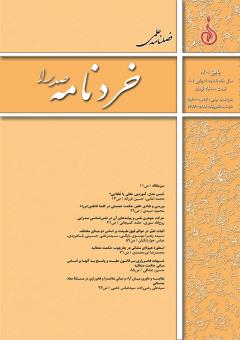حسن عدل؛ آموزهيي عقلي يا عُقلايي؟
محورهای موضوعی : مطالعات حوزه فلسفه و حکمت اسلامی
1 - دانشیار گروه فقه و مبانی حقوق، دانشگاه علوم اسلامی رضوی، مشهد، ایران
2 - دانشجوی دکتری فقه و مبانی حقوق، دانشگاه علوم اسلامی رضوی، مشهد، ایران
کلید واژه: حسن عدل, قبح ظلم, گزارههاي اخلاقي, گزارههاي بديهي, عقلي, عقلايي,
چکیده مقاله :
«عدل، حَسَن است» و «ظلم، قبيح است» قواعد و گزارههايي پركاربرد در دانشهاي مختلفند. متكلمان ايندو گزاره را عقلي، ضروريِ اولي، بديهي، قطعي و بينياز از استدلال ميدانند اما برخي فيلسوفان با انكار بداهت و قطعيت، آنها را مشهوراتي صرف انگاشتهاند كه وراي تطابق آراء عُقلا، واقعيت ديگري ندارند. در مورد اين دو گزاره يقينيانگاري بمعناي اعتقاد به صلاحيت استفاده از آنها در برهان و توليد نتايج علمي است و مشهورانگاري به كاركرد جدلي آنها اشاره دارد. برخي معتقدند مشهورانگاري در تفسير اينگونه قضايا، به فروريختن پشتوانة گزارههاي اخلاقي ميانجامد. مسئله اينجاست كه چرا در مورد ايندو گزارة بظاهر بديهي، چنين اختلاف نظر زيادي ايجاد شده است؟ يافتههاي اين پژوهش كه بشيوة توصيفي ـ تحليلي انجام پذيرفته، نشان ميدهد كه راهحل را بايد در تفكيك ميان «حُسن عقلي» و «حُسن عقلايي» جُست. دو قضية مذكور، هرگاه بعنوان قضاياي عقليِ شخصي لحاظ شوند، تصديقاتي ظني و تكويني هستند اما در مقام گزارههاي عُقلاييِ اجتماعي، بديهي و البته اعتباريند كه برخلاف نظر مشهور منطقدانان، بايد در زمرة يقينيات (نه مشهورات) قرار گيرند. علاوه بر اين، تعابيري نظير «لا عمدة لها الا الشهرة» كه توسط برخي صاحبنظران حكمت و منطق در مورد ايندو گزاره بكار رفته، بمعناي انكار واقعيت آنها نيست بلكه بمفهوم انكار بداهت و ضرورتشان در تحليلهاي عقلي ميباشد و بهمين دليل خللي در پشتوانه بودن آنها براي قضاياي اخلاقي ايجاد نميكند.
“Justice is good” and “cruelty is bad” are two of the most frequently used principles and propositions in various disciplines. Mutikallimun consider these two propositions to be rational, primary necessary, evident, certain, and needless of reasoning. However, some philosophers deny their evidence and certainty and consider them as generally accepted propositions that bear no truth except for conforming to thinkers’ views. Certainty in relation to these two propositions means believing in the correctness of their use in arguments and production of scientific results, and indemonstrability refers to their dialectical application. Some believe that the indemonstrability in the interpretation of such propositions would undermine the basis of moral propositions. The question here is why there is so much controversy about these two apparently evident propositions. The findings of this descriptive-analytic study reveal that the solution must be found in distinguishing between “intellectual goodness” and “rational goodness”. When these two propositions are considered as individual intellectual propositions, they are hypothetical and genetic judgments; however, at a rational social level, they are evident and, of course, mentally posited and, unlike the general view of logicians, they must be viewed as certain propositions (not as generally accepted ones). In addition, some statements such as “They have no basis but popularity”, which are used by some philosophers and logicians about the two propositions, are not used to deny their reality. Rather, they are intended to deny the evidence and necessity of these two propositions in intellectual analyses. Thus, no damage is done to their support for moral propositions.
